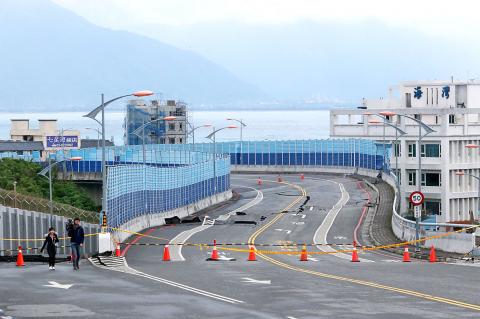The National Center for Research on Earthquake Engineering yesterday called for new laws to encourage the reconstruction of weaker structures, following the partial collapse of four buildings during Tuesday’s earthquake in Hualien.
The magnitude 6 earthquake, which occurred at 11:50pm on Tuesday, 18.3km northeast of Hualien County Hall, had an output level of 7 on the Modified Mercalli Intensity at its strongest point and caused damage to several structures, including two bridges and multiples buildings.
The Marshal Hotel suffered the most damage and was left leaning to one side after its bottom three floors crumpled.

Photo: CNA
At yesterday’s Lunar New Year-end news conference held by the Ministry of Science and Technology, center director-general Huang Shih-chien (黃世建) said the hotel, like structures that collapsed in previous earthquakes, was built before 1999 when stricter building code regulations were introduced.
This, combined with its proximity to the closest fault line, led to its collapse, Huang said.
Often these buildings have large open spaces in their ground floors, making them more prone to collapse, he said.
This is further exacerbated by the occupation of upper floors by residents, he said, adding that pillars or additional walls should be used to provide better structural support.
One of the issues stalling the reinforcement or reconstruction of older buildings is the large number of people who have property rights in the buildings.
Legal regulations governing the reconstruction process should be simplified, he added.
“If a consensus cannot be reached to move forward with reconstruction, I suggest property owners start with incremental, structural reinforcement,” he said, adding that owners of buildings with combined commercial and residential occupation be prohibited from making upper floors of their buildings publicly available until passing earthquake-resilience assessments.
Building Safety Certification Association director-general Tai Yun-fa (戴雲發) said reinforcements would not be enough and that older buildings must be reconstructed.
The Marshal Hotel had already undergone reinforcements, but was still unable to withstand a strong earthquake, he said, adding that the problem lay with its irregular facade and arcade-style architectural design.
Comparing the hotel with the collapse of the Weiguan Jinlong complex in Tainan during the earthquake on Feb. 6, 2016, Tai said that the latter differed in that its layout was not well designed.
The U-shaped design of that building, along with the use of poor-quality building materials, led to its collapse, he said.
Meanwhile, Huang said the center is capable of predicting an earthquake between five and 10 seconds in advance.
High-tech industry operators, including Taiwan Semiconductor Manufacturing Co and United Microelectronics Corp, should network their systems with the center to allow shutdown of equipment in the event of an earthquake, he said, adding this could prevent sensitive systems from damage.
The Taiwan High Speed Rail Corp is already networked with the center, he said.

The Ministry of Education (MOE) is to launch a new program to encourage international students to stay in Taiwan and explore job opportunities here after graduation, Deputy Minister of Education Yeh Ping-cheng (葉丙成) said on Friday. The government would provide full scholarships for international students to further their studies for two years in Taiwan, so those who want to pursue a master’s degree can consider applying for the program, he said. The fields included are science, technology, engineering, mathematics, semiconductors and finance, Yeh added. The program, called “Intense 2+2,” would also assist international students who completed the two years of further studies in

Former president Tsai Ing-wen (蔡英文) departed for Europe on Friday night, with planned stops in Lithuania and Denmark. Tsai arrived at Taiwan Taoyuan International Airport on Friday night, but did not speak to reporters before departing. Tsai wrote on social media later that the purpose of the trip was to reaffirm the commitment of Taiwanese to working with democratic allies to promote regional security and stability, upholding freedom and democracy, and defending their homeland. She also expressed hope that through joint efforts, Taiwan and Europe would continue to be partners building up economic resilience on the global stage. The former president was to first

Former president Tsai Ing-wen (蔡英文) on Monday called for greater cooperation between Taiwan, Lithuania and the EU to counter threats to information security, including attacks on undersea cables and other critical infrastructure. In a speech at Vilnius University in the Lithuanian capital, Tsai highlighted recent incidents in which vital undersea cables — essential for cross-border data transmission — were severed in the Taiwan Strait and the Baltic Sea over the past year. Taiwanese authorities suspect Chinese sabotage in the incidents near Taiwan’s waters, while EU leaders have said Russia is the likely culprit behind similar breaches in the Baltic. “Taiwan and our European

The Taipei District Court sentenced babysitters Liu Tsai-hsuan (劉彩萱) and Liu Jou-lin (劉若琳) to life and 18 years in prison respectively today for causing the death of a one-year-old boy in December 2023. The Taipei District Prosecutors’ Office said that Liu Tsai-hsuan was entrusted with the care of a one-year-old boy, nicknamed Kai Kai (剴剴), in August 2023 by the Child Welfare League Foundation. From Sept. 1 to Dec. 23 that year, she and her sister Liu Jou-lin allegedly committed acts of abuse against the boy, who was rushed to the hospital with severe injuries on Dec. 24, 2023, but did not